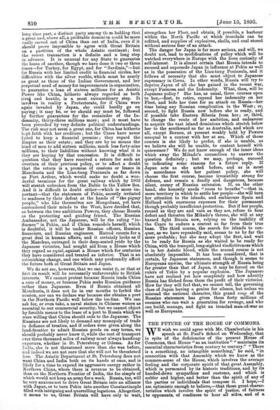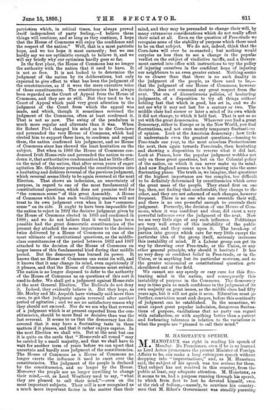THE FUTURE OF THE HOUSE OF COMMONS.
WE wish we could agree with Mr. Chamberlain in his speech at St. Paul's School on Wednesday, that in spite of the deficiencies of the present House of Commons, that House " as an institution" " maintains its essential characteristics from century to century." " There is a something, an intangible something," he said, "in connection with that Assembly which we know as the common-sense of the House, which involves the average feeling and the corporate spirit of that great Assembly, which is permeated by its historic traditions, and by its handed-down sympathies and customs, and which is nobler and higher, and better than the spirit of any of the parties or individuals that compose it. I hope,--I am optimistic enough to believe,—that these great charac- teristics which involve the spirit of justice, of fairness to opponents, of readiness to hear all sides, and of a WE wish we could agree with Mr. Chamberlain in his speech at St. Paul's School on Wednesday, that in spite of the deficiencies of the present House of Commons, that House " as an institution" " maintains its essential characteristics from century to century." " There is a something, an intangible something," he said, "in connection with that Assembly which we know as the common-sense of the House, which involves the average feeling and the corporate spirit of that great Assembly, which is permeated by its historic traditions, and by its handed-down sympathies and customs, and which is nobler and higher, and better than the spirit of any of the parties or individuals that compose it. I hope,--I am optimistic enough to believe,—that these great charac- teristics which involve the spirit of justice, of fairness to opponents, of readiness to hear all sides, and of a patriotism which, in critical times, has always proved itself independent of party feeling,—I believe these things will continue, and so long as they continue, I hope that the House of Commons will enjoy the confidence and the respect of the nation." Well, that is a most patriotic hope, and we too hope it most earnestly; but we can hardly say we are optimistic enough to believe it, and we will say briefly why our optimism hardly goes so far. In the first place, the House of Commons has no longer the authority with the nation that it used to have. It is not so free. It is not looked to to determine the judgment of the nation by its deliberations, but only expected to give effect to what has been the judgment of the constituencies, as if it were the mere executive voice of those constituencies. The constituencies have always been regarded as the Court of Appeal from the House of Commons, and they are so still. But they used to be a Court of Appeal which paid very great attention to the judgment of the Court from which the appeal was made, and which, though it sometimes reversed the judgment of the Commons, often at least confirmed it. That is not so now. The swing of the pendulum is much more regular and alternate than it was. When Sir Robert Peel changed his mind as to the Corn-laws and persuaded the very House of Commons, which had elected him to support these laws, to condemn and repeal them, the nation confirmed his judgment, and no House of Commons since has showed the least hesitation on the subject. But when in 1886 the House of Commons con- demned Irish Home-rule and persuaded the nation to con- demn it, that authoritative condemnation had so little effect on the mind of the nation, that after seven years of eager agitation Mr. Gladstone persuaded the constituencies into a hesitating and dubious reversal of the previous judgment, which reversal seems likely to be again reversed at the next Election. That shows an indecision, an uncertainty of purpose, in regard to one of the most fundamental of constitutional questions, which does not promise well for " the common- sense " of this great Assembly. A House of Commons which has such vacillating masters will not trust to its own judgment even when it has "common- sense " on its side. It ought to have been impossible for the nation to reject in 1892 the decisive judgment given by the House of Commons elected in 1885 and confirmed in 1886 ; and we do not believe that it would have been possible had the great democratic constituencies of the present day attached the same importance to the decision twice delivered by a House of Commons on one of the most ultimate of constitutional questions, as the middle- class constituencies of the period between 1832 and 1867 attached to the decision of the House of Commons on larger issues of this fundamental kind during that middle period. But the democracy has learned its power. It knows that no House of Commons can resist its will, and it knows that it may change its mind, even capriciously if it pleases, and that the House of Commons must submit. The nation is no longer disposed to defer to the authority of the House of Commons as on questions of this sort it used to defer. We shall get a judgment against Home-rule at the next General Election. The Radicals do not deny it. Indeed, they evidently believe it. But they hope, as Mr. Morley and Mr. Asquith have virtually said more than once, to get that judgment again reversed after another period of agitation ; and we see no satisfactory reason why they should not succeed. Nor do we see why that reversal of a judgment which is at present expected from the con- stituencies, should be more final or decisive than was the last reversal. It seems to us that the democracy has dis- covered that it may have a fluctuating taste in these matters if it pleases, and that it rather enjoys caprice. In the next Election we shall win. Bat at the next but one it is quite on the cards that " Home-role all round " may be carried by a small majority, and that we shall have to wait for another term of years before we can upset that uncertain and hardly sane judgment of the constituencies. The House of Commons as a House of Commons no longer exerts the influence it used to exert over the constituencies. The judgment of the people is declared by the constituencies, and no longer by the House. Moreover the people are no longer unwilling to change their mind,—or, as Lord Westbury used to say, "what they are pleased to call their mind,"—even on the most important subjects. Their will is now recognised as a much more important factor in the matter than their mind, and they may be persuaded to change their will, by many extraneous considerations which do not really affect their mind at all. Even on the question of Free-trade we recognise none of the stability of purpose which there used to be on that subject. We do not, indeed, think that the Corn-laws will ever be re-enacted ; but nothing would surprise us less than to see a change in the popular verdict on the subject of vindictive tariffs, and a Govern- ment carried into office with instructions to try the policy of injuring ourselves in the confident hope of injuring our neighbours to an even greater extent. Nothing seems to us clearer than that there is no such finality in the judgment of the people, as there used to be,— that the judgment of one House of Commons, however decisive, does not command any great respect from the next. The era of discontinuous policies, of hesitating judgments, of a disposition to try all things without holding fast that which is good, has set in, and we do not see why it may not last for a century or two. The middle class had sooner or later a mind of its own which it did not change, to which it held fast. That is not so as yet with the great democracies. Wherever you find a great democracy, either in Europe or in the New World, you find fluctuations, and not even merely temporary fluctuations of opinion. Look at the American democracy ; how little it understands even the greatest questions,—leaning to Free-trade one year, to the most senseless Protectionism the next, then again towards Free-trade, then hesitating and showing a disposition to reverse what it did last. Look at France, how the popular judgment wobbles not only on these great questions, but on the Colonial policy of the nation, on which it can never make up its mind. And now England seems to us to be passing into the same fluctuating phase. The truth is, we imagine, that questions of the highest importance are too complex, too difficult to be definitely determined by constituencies which cover the great mass of the people. They stand first on one leg, then, not finding that comfortable, they change to the other, and they are not ashamed of such changes, however frequent. There is no one who can override their will, and there is no one powerful enough to overrule their judgment. Formerly, the decision of one House of Com- mons, when it was confident and clear, did exert a very powerful influence over the judgment of the next. Now we see very little sign of any such influence. Politicians are very well aware of this instability of the public judgment, and they count upon it. The break-up of parties into groups which care for very little except the particular idea of the group itself, seriously increases this instability of mind. If a Labour group can get its way by throwing over Free-trade, or the Union, or any other general principle, why should it hesitate ? It has no very deep or confident belief in Free-trade, or in the Union, or in anything but its particular nostrum, and so the greater economical or constitutional question gets shouldered out of the field.
We cannot see any speedy or easy cure for this fluc- tuating mind in the nation, and consequently this instability of purpose in, the Commons. The democracy may in time gain as much confidence in the judgment of its own majority on great issues, as the middle class had fifty years ago, but it will not gain it soon. Education must go further, conviction must sink deeper, before this continuity of judgment can be established. In the meantime, we must expect great popular indecision, dangerous fluctua- tions of purpose, vacillations that no party can regard with satisfaction, or with anything better than a patient and forbearing tolerance in relation to the variations in what the people are " pleased to call their mind."



































 Previous page
Previous page